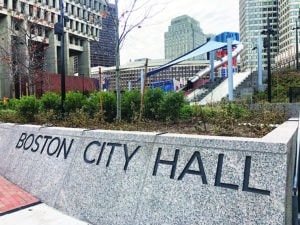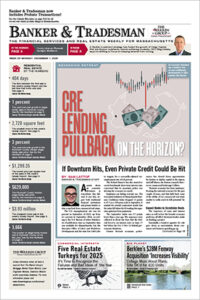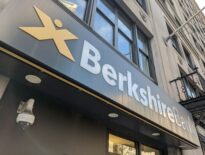Boston City Councilor Ed Flynn dramatically scuppered attempts to bring a last-minute compromise on city commercial property tax rates up for a vote Wednesday afternoon.
Flynn cast the lone dissenting vote to add the deal announced by Mayor Michelle Wu earlier that day to the City Council’s agenda.
Due to council rules, the vote to add such a last-minute item needed to be unanimous, sending councilors scrambling to set up an emergency meeting for Friday to vote on a home rule petition enshrining the deal struck by the mayor and four major business and business-backed groups after months of acrimony.
Flynn’s vote caused gasps and startled looks in the City Council chamber, with a member of the audience crying out “shame on you!” before being silenced by City Council President Ruthzee Louijeune.
Because city property tax rates must be set by November, the tax deal must pass the Boston City Council, the state House of Representatives and the state Senate in the next few days.
Friday’s special council meeting will enable the petition to be referred to committee, enabling for a full council vote next Wednesday, Wu said today.
“Fingers crossed. We want to make sure that everyone’s questions are answered and everyone has a chance to vet the latest proposals and terms, but that will keep us right on time,” the mayor said after attending a Dorchester affordable housing event.
But any delay increases the risk of causing a big jump in residential property tax bills. Wu’s office has estimated that the average-value single-family home will see its January quarterly tax bill would jump 28 percent over the prior bill, compared to about 9 percent under the compromise deal. Without any deal, that same home’s annual tax bill would rise 14 percent.
Wu has argued the city’s commercial tax rate needs to be temporarily increased to compensate for crashing downtown Boston office property values and to prevent the city’s low-income and senior homeowners from being saddled with sudden, multi-hundred-dollar increases in their tax bills that could be hard or impossible for them to pay.
Flynn’s long been a critic of Wu’s tax rate increase proposal, warning this summer that it would set off a “doom loop” downtown.
Business groups have warned that a too-high rate increase would hammer downtown landlords’ ability to make the investments troubled office buildings need to attract tenants again, and would create significant financial pain for many retailers and other business tenants who operate under triple-net leases.
Instead, they argued the city should trim its budget, an idea Wu said in a letter to the City Council Oct. 15 would force the city to pause hiring in several departments, cancel police, fire and EMS academy classes, reduce the city contribution to its unfunded pension liabilities by $20 million and cancel the purchase of technology needed to digitize and modernize the city’s Inspectional Services Department’s building permit process – a process that’s been a perennial source of frustration for developers.
In a statement sent to Banker & Tradesman Wednesday afternoon, Flynn said he objected to the closed-door nature of Wu’s negotiations with Senate President Karen Spilka, the Greater Boston Chamber of Commerce, developer trade group NAIOP-MA, the Boston Municipal Research Bureau and the Massachusetts Taxpayers Foundation. He also called for a “blue-ribbon” commission to find ways to diversify the city’s revenue streams away from property taxes – something the Greater Boston Chamber and the Massachusetts Taxpayers Foundation have also called for.
“[I]t is critical that we adhere to the transparency and accountability that the taxpayers of Boston deserve. This legislation should follow the proper procedures, and not bypass our Council Rules to fast track a bill to raise the tax rate on businesses beyond the state limit,” he said. “The City neglected to compromise in good faith for months on cuts to our 8% budget increase, implementing a hiring freeze, or considering our revenue and alternatives from fiscal watchdogs.”
Flynn isn’t alone in his objections to the deal. The Small Property Owners Association, which represents small landlords that would see their tax bills jump significantly alongside homeowners’ bills if there is no deal, has been emailing its members to oppose the deal announced Wednesday.
The deal would see Wu’s proposed five-year tax rate increase shrunk down to three years, and see its severity reduced while the city would also spend $45 million over the three-year period to cushion the impact on small businesses.
Editor’s note: This report has been updated with comments from Mayor Michelle Wu and Councilor Ed Flynn.
Banker & Tradesman staff writer Steve Adams contributed to this report.







